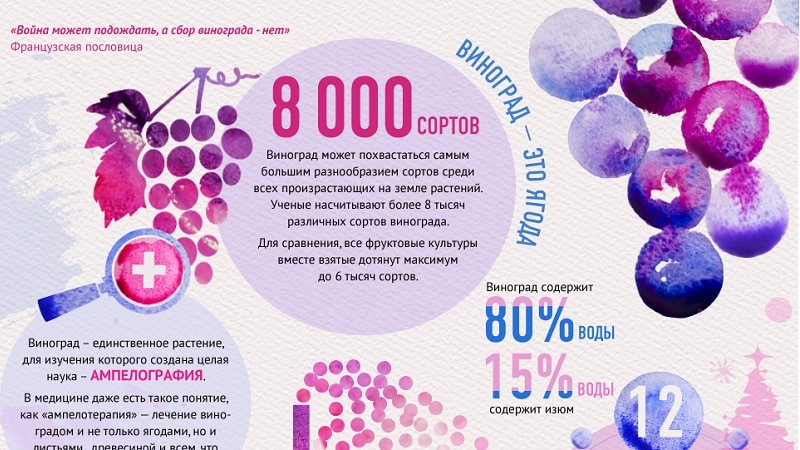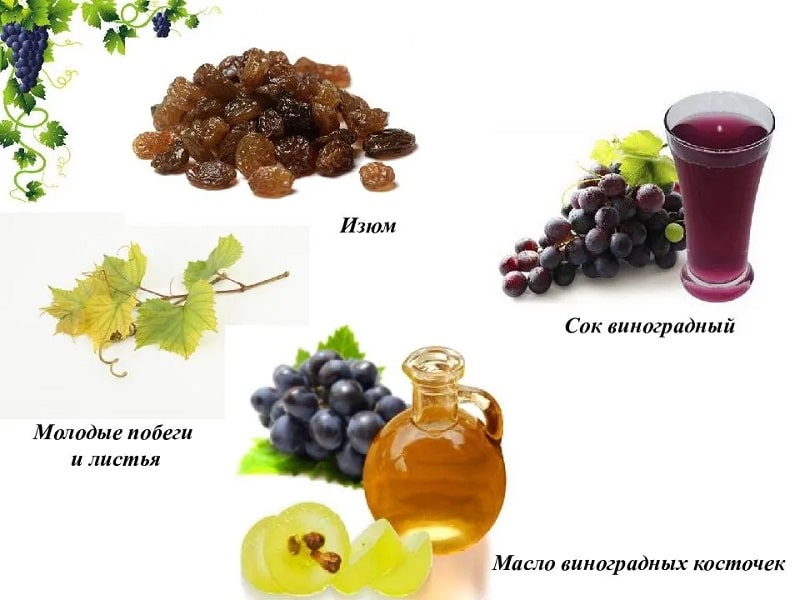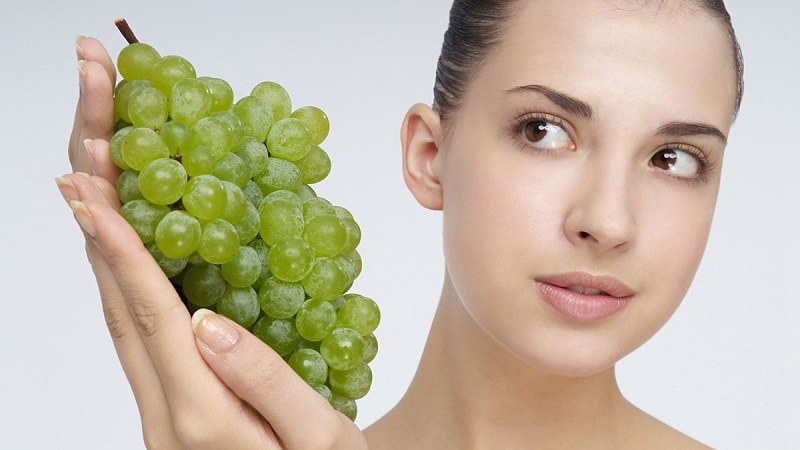The harm and benefits of grapes for a woman’s body
Almost all parts of grapes are used as raw materials for the preparation of drinks, dishes and cosmetics. The fruits are known for their antioxidant, cardio- and angioprotective properties. There is a separate section of traditional medicine - ampelotherapy, or grape therapy.
Chemical composition and properties of grapes
Grapes contain more than 150 biologically active substances, the benefits of which have long been discussed by experts.
Interesting! The Epic of Gilgamesh, one of the oldest works of literature, first mentioned a plant whose modern name is grape.
Although the fruits do not contain as many vitamins as raspberries or currants, their chemical composition is unique. The berries contain a lot of antioxidants, organic acids and fiber, 10–33% sugar, minerals (calcium, silicon, magnesium, iron, manganese, cobalt) and vitamins (groups B, C, A, P, K).

Enzymes in fruits:
- invertase;
- pectinase;
- lipase;
- esterase;
- protease, etc.
Grapes contain a lot of silicon (163% of the daily value), boron (521%), cobalt (20%), manganese (39%) and potassium (10%). The amount of the latter increases 3 times in raisins. The sour taste of the berries is due to the high content of tartaric and malic acids.
The fruit contains a small amount of unsaturated and saturated fatty acids:
- oleic;
- linolenic;
- palmitic;
- stearic;
- linoleic;
- myristic.
The fruits contain flavonoids quercetin and malvidin, glycosides, pectins and tannins.
Calorie content and BZHU
The calorie content of 100 g of berries depends on grape varieties:
- white - 65 kcal;
- red - 70 kcal;
- black - 72 kcal.
Consisting of 97% water, it contains a large amount of carbohydrates, the main part of which is glucose: from 15.4 g in white varieties to 16.6 g in black varieties.
Fats are practically absent and amount (per 100 g):
- in white - 0.64 g;
- in red - 0.61 g;
- in black - 0.63 g.
The protein content is approximately the same.

The benefits and harms of grapes for a woman’s body
If consumed correctly and regularly, dark grapes will be much healthier than light varieties. It prevents the development of cancer of the ovaries, breast and other organs, and can be effective in polycystic ovary syndrome. Natural phytoalexin helps with this - resveratrol, which has antioxidant, anti-inflammatory and antitumor properties.
Fruits are useful for varicose veins: they relieve swelling and strengthen veins. Several venotonic drugs have been made based on grapes.
Berries cover the body's need for glucose and fructose during long-term diets. However, consuming them in excess can raise blood sugar levels and lead to excess weight due to increased appetite and overeating.
Medicinal properties for various diseases
Thanks to vitamins K, P, B9 and iron, grapes help avoid anemia and increase hemoglobin, normalize blood pressure, strengthen blood vessels, accelerate the renewal of bone tissue cells, and improve metabolism.Due to the high content of antioxidants, it prevents age-related changes, strengthens nails and hair, and reduces the risk of cardiovascular diseases.
Grapes and juice from them are useful for diseases of the gastrointestinal tract, which are accompanied by reduced secretion of gastric juice. The berries are effective in acute inflammatory processes of the respiratory tract, bronchial asthma and pleurisy, and are used to treat diseases of the cardiovascular system and as an antitoxic agent for poisoning.
Resveratrol - a natural antioxidant from the group of polyphenols - is found in the peel of dark berries varieties. It has many useful properties:
- suppresses viral infections;
- reduces the risk of developing pathologies of the heart and blood vessels;
- normalizes sugar and cholesterol levels;
- protects against senile dementia, Alzheimer's disease;
- can strengthen bones;
- can improve mood.
Dark grapes normalize heart rate, blood pressure, improve blood composition and increase hemoglobin levels. It has a positive effect on liver function, cleanses the body of accumulated toxins, increases the overall tone of the body and helps rapid recovery after heavy physical exertion and stress.

Contraindications
In addition to its beneficial properties, grapes also have contraindications. It is not recommended for use when:
- intestinal disorders;
- diarrhea;
- exacerbation of gastrointestinal diseases;
- diabetes mellitus;
- obesity;
- colitis;
- stomach and duodenal ulcers;
- disturbance of potassium metabolism, accompanied by renal failure.
This is a strong allergen. An allergic reaction can occur at any age, and the purity of the product plays a huge role here, i.e.e. lack of pesticides during cultivation.
Important! Unripe grapes irritate the mucous membranes of the stomach and intestines.
Berries are contraindicated in case of individual intolerance and for persons taking blood thinning medications (due to a decrease in their effect).
Grapes for women during pregnancy
Although the fruits are rich in iron, which maintains hemoglobin levels in the blood, their peel causes increased gas formation, which is undesirable for pregnant woman. However, this effect can be easily eliminated by replacing the berries with juice. Another plus: grapes have a diuretic effect, which reduces swelling.
Despite all the beneficial properties of fruits, there are reasons to exclude them from the diet of pregnant and lactating women:
- with excessive consumption, intensive growth of the fetus is possible, which will cause difficulties during childbirth;
- the skin may contain fungi and spores, which often act as allergens;
- there is a risk of gaining excess weight and problems with the pancreas;
- With regular and excessive use, spontaneous abortion cannot be ruled out.
Therefore, it is important to consult a doctor before consuming grapes.
When breastfeeding
During lactation, the product may negatively affect the baby's gastrointestinal tract. The active substances contained in mother's milk can cause increased formation of gases, which will cause anxiety to the baby.
It is better to use dark grape varieties because they contain more nutrients. A safe dose in the absence of contraindications is no more than 500 g per week.
What are the benefits of berries for beauty?
Thanks to its antioxidant properties, grapes are actively used in cosmetology; they are one of the main ingredients in natural skin care cosmetics recipes.
For hair
Oil from grape seeds Suitable for all hair types, but especially useful for thin and weakened hair:
- nourishes and moisturizes roots;
- protects;
- accelerates growth;
- strengthens hair follicles;
- activates blood circulation;
- normalizes the functioning of the sebaceous glands.
For skin
Oil from grape seed extract rejuvenates, softens the epidermis, nourishes the skin, and accelerates the healing of wounds. It is actively used in anti-cellulite massage and to soften lips.
The product is used for makeup removal, after which further moisturizing is not required. The oil is quickly absorbed and does not leave a greasy shine.
For weight loss
Berries are high in calories and have a high glycemic index.
Reference. Resveratol, contained in dark grapes, together with orlistat can help in weight loss in obesity. In this case, a preliminary consultation with a doctor is required.
For weight loss You can consider a mono-diet: you are allowed to eat 3 kg of grapes in 2 days, providing yourself with enough water.

Application in cosmetology
In the East, berries are considered the elixir of youth. Grape seed oil is included in many cosmetic products and is used as an independent ingredient for preparing homemade cosmetics.
If you cut the berry and wipe the skin with it, this will give the skin tone and hydration, remove excess sebaceous secretions, and saturate it with vitamins. Frozen juice is effective for treating your face and hands. The product perfectly nourishes aging skin - after a week it becomes more toned and hydrated.
In its pure form, the juice is used for facial massage, for rubbing into the scalp, and for treating children's skin: the product has antibacterial and wound-healing effects. Used as additives in shampoos, soaps, creams, balms.
How to choose, store and use correctly
Choosing grapes, it is important to know that brown spots and pigmentation on the skin do not mean that it is of poor quality. It is better to pay attention to the integrity of the fruit. Fresh grapes have a whitish coating on the surface.
According to taste, grapes are divided into 4 groups:
- ordinary taste - a combination of sweetness and acidity in various proportions, without any special features;
- nutmeg - the nutmeg shade is clearly visible;
- nightshade - has a herbaceous flavor similar to the taste of nightshade berries;
- isabelle - fruits with a strong flavor, reminiscent of strawberry, pineapple or blackcurrant, most often have slimy pulp.
Grapes go well with sweet fruits, but it is better not to eat them with other foods, as this will lead to fermentation in the intestines and the formation of ethanol in the body.
Important! Due to a decrease in natural insulin production, it is undesirable to eat fruits in the evening, since their processing will be difficult for the body. As a last resort, it is allowed to enjoy 5-6 grapes.
It is not recommended to combine grapes with melon, cucumbers, milk and fatty foods to avoid indigestion.
The juice weakens tooth enamel and increases the destruction of carious teeth. Therefore, after consuming it, it is recommended to rinse your mouth with clean water. You should not brush your teeth right away, as it will severely damage the enamel.
Store berries Allowed for several days in the refrigerator, in the compartment for fruits and vegetables. Keep unwashed fruits in bags with holes or open, away from other products, otherwise they will quickly absorb foreign odors. Grape varieties with thick skin and dense pulp, having loose clusters, are preserved better, and dark-colored ones last longer than light-colored ones.
On average, it is recommended to consume no more than 10–15 large berries or about 100 g per day. In this case, the benefit will be maximum and the harm will be minimal.
Conclusion
The vitamins, minerals, polyphenols and tannins that grapes contain bring much more benefit to the body than harm. Its consumption in moderate quantities strengthens the body's protective functions, prevents the development of inflammatory processes, cardiovascular diseases and anemia.